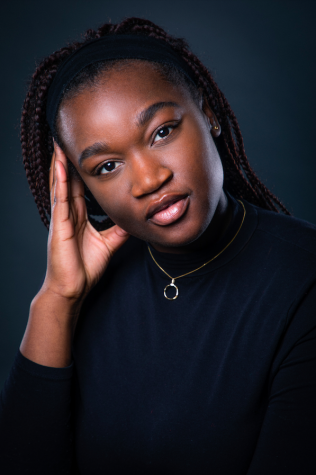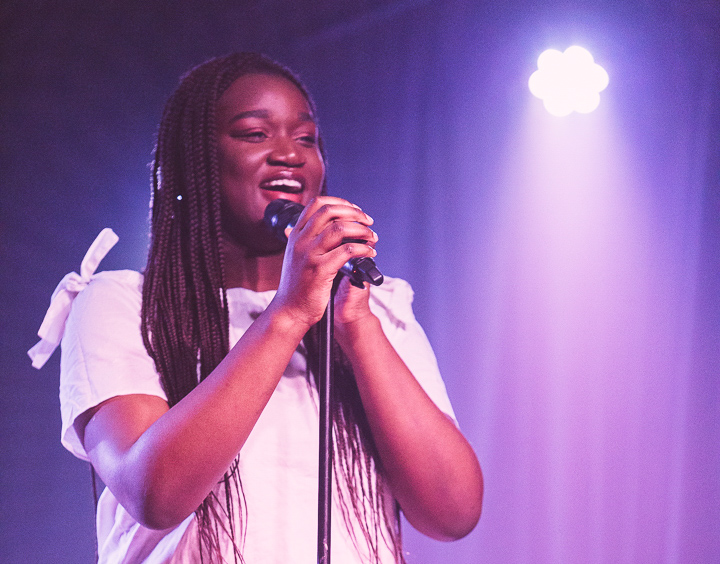Angela Daudu on her songwriting process: My music as refuge
Singer-songwriter Angela Daudu reflects on her synergistic relationship with music prior to, and in the wake of, the challenging events of these past few years.
Photo: Owen Mertens Photography
Singer-songwriter Angela Daudu performing at Talent Nation in 2019. (Photo by Owen Mertens Photography)
October 22, 2021
My experience with music has always been an intimate one. I remember the transformative sensation of listening to choir members express pure joy at church in Nigeria. I remember watching video after video of singers such as Whitney Houston, Beyoncé and Yolanda Adams and thinking, “I want to do that.” Just like that, I decided I would.
I remember when I first learned that I could write my own songs. I remember the quirky 30-second-long tunes I created about beautiful butterflies flying in the sky or the pitter-patter of rain and thunder. I remember how feeling music and interacting with it through a creative lens grounded me in the realization that I had a space where I would always be welcome.
In this space, I can express the simplest observations or my deepest fears and desires. I can imagine and inhabit a universe different from or similar to the one I know as I desire. Music and songwriting have always given me this — they have gifted me with a liberation, an escape, a level of contemplation that I am yet to find anywhere else.

I am an 18-year-old sophomore at Gallatin and my working concentration is “A Sociological Approach to Human Development through Social Media and Music.” Of course, it is subject to change, but right now, I am interested in learning about the nuances of 21st-century Western society and how social media and music have been and can be actualized as active, socially and politically motivating tools.
My learning over the past couple of years always brings me back to two root questions: “To what extent can music be politically influential?” and “Under what conditions should media be regulated, if at all?” The answers to these questions are still unknown, but what do I know is that, personally, music — whether it be the music that I create or the music that I listen to — provides me with refuge, insight and a heightened sense of connection to myself and with others.
Music is my most genuine means of reflection on myself and the world, and until this year, I never realized how necessary it was. I recognized that music was important to me, of course, but only after living through these past few years have I recognized that music — specifically my ability to write music — is a very significant part of what makes me whole.
Music and songwriting have always given me this — they have gifted me with a liberation, an escape, a level of contemplation that I am yet to find anywhere else.
Growing into adulthood as a Black woman is challenging enough. Add the stress of the pandemic and the growing reaction to racial violence and police brutality, not only here in America but also in Nigeria, where I grew up, and various other places around the world. I know things were not nearly as bad for me as they were for many others; I had a home to come back to, food to eat and a healthy family to support me. However, believe me when I say that had I not had songwriting as my escape from society, I don’t know how I would’ve survived.
I wrote the song “More Than This” on May 28, 2020. I had spent days on the internet watching people express the deepest heartbreak and resentment in response to the death of George Floyd. Many of these people were met with compassion, empathy and a drive to change this world for the better, but many were also met with the most disgusting and insensitive expressions of invalidation and racism. Of course, it was during this time that we also saw an uptick of internet advocacy the likes of which I had never seen before.
I liked and scrolled past post after post ranging from informative to artistic — posts from which the genuineness of the sharer could not be determined — and found myself growing tired. What resonated most with me were the infographics. Something about the synthesis of so many lives into statistics, statistics that were inevitably disposed to grow, hit me hard. So I turned on my keyboard, began playing a chord progression and started writing:
It gets to be a bit frustrating when no one really cares about us
When no one wants to hear our voice again
I get to feel a bit frustrated, but then again, it’s not surprising that no one really wants to hear us talk
How many more disasters?
How many more? I’m fed up
How many ‘til you think that it’s enough?
’Cause I wanna be more than just a number
I wanna be more than just a threat
I wanna be more than just a memory
I wanna be more than dead
I wanna be more
It happens when I least expect it, forgot that I was so neglected
and no one really wants to see us loved
And since it’s working in your favour to fetishize and steal behavior I guess we’re gonna to put this in our hands
How many more reactions?
How many more ‘I can’t breathe’?
How many ‘til you think we’ve bled enough?
’Cause I wanna be more than just a number
I wanna be more than just a threat
I wanna be more than just a memory
I wanna be more than dead
I wanna be more
Before long, I completed a song, but I didn’t know what to do with it. I recorded a video, but I wasn’t sure if I wanted to share it. It said everything that I had been struggling to express for days. It was a frighteningly vulnerable, personal and real perspective. However, this perspective came from someone who remained relatively untouched by such blatant forms of physical racism.
I began to question whether I should share it at all. Was I only adding more to the performative collection of social media posts that I had quickly grown tired of? Was I taking a significant moment and making it about myself? Had I completely missed the point? I spoke candidly with friends and family about these doubts, ultimately realizing that all that mattered was my intention. All that mattered was that I was sharing my voice as a Black woman and that in itself is valid. That should never be silenced.
I uploaded my song. It would later be re-recorded as a collaborative project for NYUnited: The All-University Variety Show. I, along with Zac Geinzer and Brenna Rodriguez, created a soft ballad that, instrumentally, was meant to support my lyrics and not overpower them. The process was straightforward. I sent a recording to Geinzer and saw the completed piece for the first time at the showcase. Accompanying my performance was a timelapse of a portrait of George Floyd being drawn by artist Denise Anthony.
The lyrics came simultaneously — almost automatically — with the formulation of my melody. However, this is not how the songwriting process always goes. Sometimes, I start with music software, such as Logic Pro X, which is what I did with my song “Another Year.” Sometimes, I create an instrumental or a beat first, and other times I have lyrics written down that I incorporate into a larger project. This is one of the many aspects of songwriting I appreciate; the process is so dynamic, meaning that no two songs will ever be the same. I take time to create them and make sure that their melodic, instrumental and structural composition are distinct.
When I sing, when I listen to music, when I create music, there is an unnameable magic that is felt, an interpersonal connection that is established between the listener and the creator. I am in awe of that sensation, and that is why my greatest hope is for people to feel something when they hear my work.
In the same way that the musical elements of my songs are different, so are the subject matters. I often have trouble recognizing that whatever I create, whether it be politically motivated, personal or imaginative, is a valid representation of myself as an artist and valuable to those I share it with. I once thought that it is an artist’s responsibility to reflect the world that they are living in and to inspire change. However, I have now come to see that as only part of the story. An artist must have the liberty to create whatever nonsense they desire, and I say “nonsense” in the most complimentary manner. This new understanding has fueled the exploration of my skills this past year, motivating my desire to share more music, perform live again, and make music connections both within and outside of NYU.
Music is an integral part of who I am as an individual, but it is also essential to who we are as beings on this earth because it is another form of communication. When I sing, when I listen to music, when I create music, there is an unnameable magic that is felt, an interpersonal connection that is established between the listener and the creator. I am in awe of that sensation, and that is why my greatest hope is for people to feel something when they hear my work. Music is a transformative form of communication. Each interaction with it is, therefore, an attempt to comprehend, contribute to and master the ever-changing, entirely accepting musical language. So I am honored to speak it, however minutely, and I take the responsibility very seriously.
Contact Angela Daudu at [email protected].
























































































































































